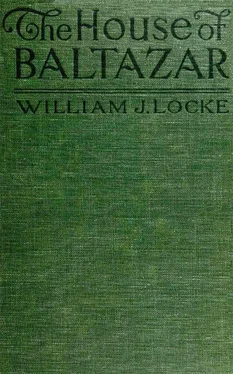“May I make a note of it?” said Quong Ho, scribbling the phrase across his mathematical manuscript.
Baltazar rose from his chair by the long deal table and relit his pipe over the chimney of a lamp.
“You’ve put me out. What the blazes were we talking about?”
“The present world condition,” replied Quong Ho.
“Then I assert,” said Baltazar, “that the present state of the world is rotten. It’s no place for intellectual reformers like you and me. What are the words of Confucius known to every schoolboy? ‘With sincerity and truth unite a desire for self-culture. Lay down your life rather than quit the path of virtue. Enter not a state which is tottering to its fall. When Law obtains in the Empire let yourself be seen: when lawlessness reigns, retire into obscurity.’ ”
“But supposing,” persisted Quong Ho, “the state of the devil-driven world is of vital interest?”
“It can be of vital interest only to those hurtling down to destruction. To us, who have retired into the obscure aloofness recommended by the great philosopher, it can be of no possible concern.”
“It is well,” said Quong Ho.
“I know it is,” remarked Baltazar, with a yawn. “Another night let us have a slightly more intelligent conversation.”
Quong Ho retired, his conscience finally set at rest. After all, was not his master right? What could he do of any use in the world rudely at war? Was he not serving the truest interests of humanity by retiring at this juncture and devoting the harvest of his great learning to a future generation?
“Soldiers,” said Quong Ho the next day, looking into the unspeculative topaz eyes of the goat which he had been milking, “are as numerous as the sands of the desert, and politicians as the mosquitoes in a swamp; they are swept away and the world misses them not; but philosophers are rare, and the loss of one of them is a supreme world calamity.”
“Baa-a-a!” said the goat.
“I perceive that you too have wisdom,” said Quong Ho. “You appreciate the privilege of living under the same roof as the illustrious Baltazar.”
He burst into an unaccustomed laugh. Conversation with a goat appealed to his prim sense of humour. But all the same, he expressed his own deeply-rooted conviction. To the keen-brained young Chinaman, Baltazar appeared as a man of stupendous intellectual force. His knowledge of the abstract sciences of the Western world would have commanded his respect; but his vast Chinese erudition, acknowledged with admiration by Mandarins and scholars and other Great Ones of China, gave Quong Ho cause for a veneration reaching almost to idolatry.
Also Baltazar, for all his patriarchal years, earned his pupil’s respect as a man of marvellous muscle and endurance. During the winter, when the inclemency of the weather forbade agricultural pursuits—and on that moorland waste the weather abandoned itself to every capricious devildom within meteorological possibilities—Baltazar, having ordered a set of gloves from London, gave boxing lessons to his disciple. At first Quong Ho was shocked. How could so contemptible a person as he ever make a pretence of smiting the highly honourable face of his master? Baltazar bade him try. He would give him an hour’s extra private tuition for every hit. And Quong Ho, encouraged by so splendid a prize, tried, at first diffidently, then earnestly, then zealously, then desperately, then bald-headedly, but never a wild blow could pass the easy guard of his smiling master.
“You see, Quong Ho, it’s a science,” said Baltazar. “Now I’m going to hit you.” And he feinted and struck out with his left and sent his disciple swinging across the room. “It is also a game,” he added, holding up his hand, “because what I have just done did not hurt you in the least.”
Quong Ho rubbed his jaw. “It was like the kiss of a butterfly,” said he.
“Here endeth the First Lesson,” said Baltazar. “The English etiquette now requires that we should shake hands.”
When they had gone through the formality Baltazar continued:
“You of all non-English people oughtn’t to be astonished. Did not the same ceremony exist in your country over two thousand years ago? Is it not referred to in the Analects?”
“Sir,” said the breathless and perspiring Quong Ho, “I have unworthily forgotten.”
“Did not the Master say: ‘The true gentleman is never contentious. If a spirit of rivalry is anywhere unavoidable, it is at a shooting-match. Yet even here he courteously salutes his opponents before taking up his position’—we ought to have shaken hands before starting, but we’ll do it next time—‘and again when, having lost, he retires to drink the forfeit-cup’—your forfeit-cup being the loss of the extra hours of tuition. ‘So that even when competing, he remains a true gentleman.’ ”
“I remember now,” said Quong Ho.
“I’m glad you do,” replied Baltazar. “That is the lofty spirit in which we shall continue this exceedingly health-giving science and pastime.”
And they continued. The young Chinaman, lithe, hard, physically perfect, little more than half the age of his tutor, devoted himself, with his Chinese assiduity, to the mastery of the fascinating art, and succeeded eventually in giving Baltazar most interesting encounters; he realized that fierce blows planted on venerable features were taken, nay applauded, in the spirit of the Confucian gentleman; he also accepted in the same gentlemanly way the hammering that he invariably received. It was after some months of this training, when he was able to discount merely superior science, that he bowed down before Baltazar not only as before an intellect, but as before a marvellous physical man.
There came a truce, however—the following winter—when Baltazar, wise in his elderly generation, foresaw the inevitable supremacy of youth, and ordered new toys from London—foils, masks and fencing jackets. The gloves mouldered in a broken-down potting-shed, and Quong Ho again started, as a tyro, to learn a new athletic accomplishment. Thus in his disciple’s sound body Baltazar contrived to maintain a sound and humble mind. He knew that he was held in deep respect by Quong Ho. But it never occurred to his careless mind that Quong Ho regarded him as a kind of god. He accepted the homage as a matter of course.
In these idyllic conditions John Baltazar accounted himself serenely happy. His scholarly solitude was undisturbed by the windy ways of men or the windy ways of moorland nature. The former spent themselves before reaching him; at the latter he snapped his fingers. What to him was the seasons’ difference? So absorbed was he in his work, so circumscribed in his walled enclosure beyond which he seldom set foot, that he barely even noticed the hourly change on the sensitive face of the moor. And season followed season, and the piles of manuscript, exquisitely corrected for the printer, grew in height, and Quong Ho assimilated Higher Mathematics as though it were rice; and everything was for the best in the best of all possible little intellectual worlds.
Конец ознакомительного фрагмента.
Текст предоставлен ООО «ЛитРес».
Прочитайте эту книгу целиком, купив полную легальную версию на ЛитРес.
Безопасно оплатить книгу можно банковской картой Visa, MasterCard, Maestro, со счета мобильного телефона, с платежного терминала, в салоне МТС или Связной, через PayPal, WebMoney, Яндекс.Деньги, QIWI Кошелек, бонусными картами или другим удобным Вам способом.












